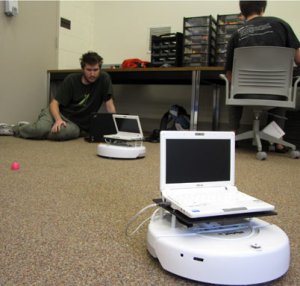Dec 30 2010
Students are researching on human thought and how it outsmarts automation in real life in Cognitive Robotics Lab at Rensselaer Polytechnic Institute.
 The lab is equipped with five “Create” robots.
The lab is equipped with five “Create” robots.
The lab comprises 20 programmable robots that will permit students to examine the actual functioning of computer models that imitate human thought.
Professor Vladislav Daniel Veksler said that robots will enable them to identify the troubles humans undergo while handling their environment. Cognitive Robotics adopts the study of cognitive science and progress in cognitive robotics changes to unreal intelligence, which tries to formulate effective computer systems modeled on human thought.
Professor Bram Van Heuveln has organized the new lab. According to him, cognitive scientists have formulated a suite of components, namely planning, perception/action, memory, reasoning and decision-making, and these elements make up the human thought. The elements are able to solve complex problems when they are modeled and connected in a proper way. Since robots perform in the real world, robotics is identified as an ideal testing base to examine the cognitive solution.
The new Cognitive Robotics Lab is open to all Rensselaer students. It features 5 Create robots, namely a Roomba robotic vacuum cleaner coupled with a laptop, one Chiara, 10 LEGO robots coupled with the Sony Handy Board robotic controller and 3 hand-eye systems.